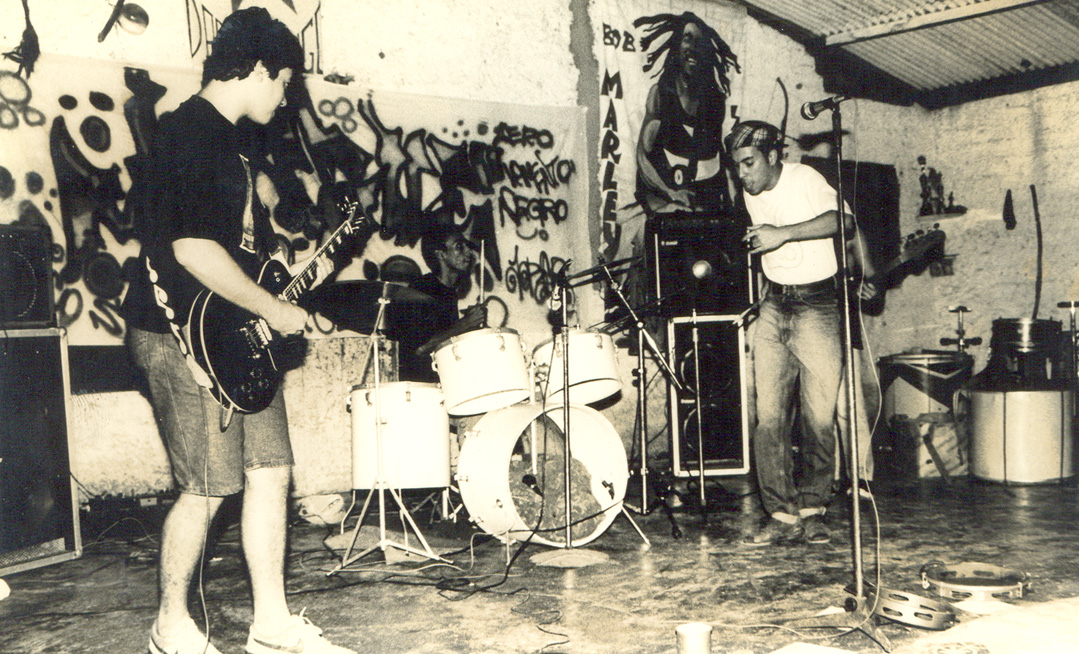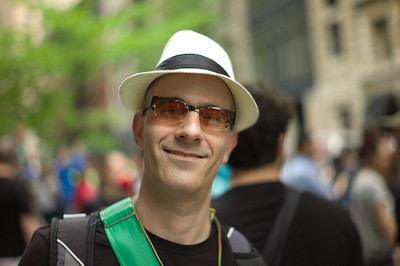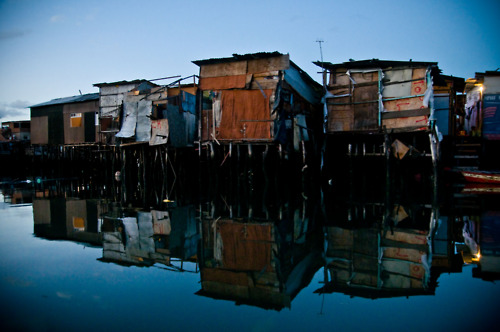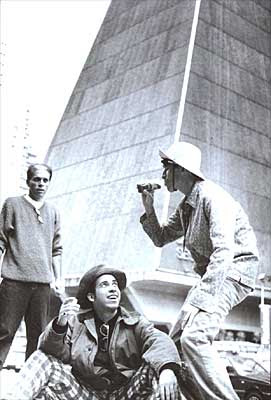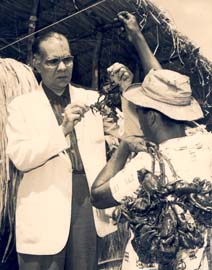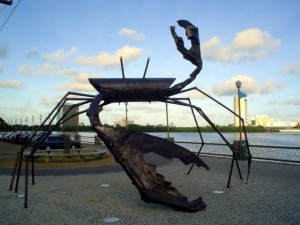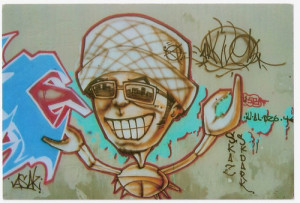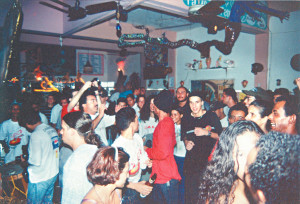Philip Galinsky, founder and director of Samba New York!, has deep ties to Afropop. Philip's PhD dissertation (later published by Routledge), Maracatu Atomico: Tradition, Modernity and Postmodernity in the Mangue Movement and the "New Music Scene" of Recife, Pernambuco, Brazil was inspired by a 1994 Afropop show. Philip also did tremendous work, as lead writer, researcher and editor for our "Samba at the Dawn of Modern Brazil" education project. Bringing the Afropop connection full circle, producer Jesse Brent interviewed Philip for a new show that updates our 1994 report on mangue, "Crabs With Brains: The Mangue Revolution and New Sounds of Recife."
Jesse Brent: Could you start by introducing yourself and talking about how you first became interested in mangue bit?
Philip Galinsky: My name is Philip Galinsky. I’m an ethnomusicologist and percussionist, specializing in Brazilian music, and I’m founder and director of the group Samba New York! I first heard about mangue when I was finishing my masters thesis in ethnomusicology, which was on pagode samba, and I was on the lookout for topics for my PhD dissertation. I heard a program on Afropop Worldwide on new sounds from Brazil in 1994 and on that program was Chico Science and Nação Zumbi. When I heard that band, I was completely transfixed. I said, “Who is this? What is this sound?” I had never heard anything like that before. It was this incredible mixture of maracatu and rock ‘n’ roll and hip-hop influences. That really sparked my interest. And that led to me digging around and eventually, deciding to do my doctoral research on mangue and the new music scene of Recife.
I should mention that Afropop Worldwide has been a tremendous influence on me in general. When I was first getting into the music of Brazil, the music of Africa and the African diaspora, back in the early 1990s, Afropop Worldwide was an essential reference for me. It was a major resource and source of knowledge and entertainment. I learned so much more about samba, and so much of what I know about all these different forms of music, I learned on Afropop Worldwide. So, you guys are doing an amazing job. Keep it up!
Can you talk a little bit about Recife before the mangue bit movement started--what it was like, in terms of the economic conditions and also the music scene?
The Recife music scene before mangue was quite limited in a lot of ways. Throughout Brazil, there was a boom of local rock music in the 1980s, particularly in cities in the south of Brazil. In Recife, there was an underground rock scene, but in my research that I did in Recife back in 1998, musicians and other folks on the scene I spoke with said that there wasn't really a strong music scene, especially of local bands, in the 1980s, so it was very difficult to make a name for yourself. There was no place to record a decent demo, very few places to play. Musically, Recife's always been extremely rich in culture--music, dance, expressive culture, but a lot of the local folk music and dance forms were very much marginalized for many years before the emergence of mangue. That's the backdrop. Also, I should mention that in the mid-1980s, the Brazilian dictatorship ended and there was a return to democracy, so there was a flood of foreign music coming into Brazil at that time. Many of the musicians and other people who were some of the pioneers of the mangue movement in the 1990s were absorbing all of these foreign musics that were coming into Recife for the first time, or maybe not for the first time, but to a much greater extent than before. Socio-economically, Recife was considered the fourth worst city in the world to live in, according to an organization in Washington DC at the time in the 1980s. That's how it was classified. And when I was in Recife in 1998, I can verify that it was dire. There was extreme poverty throughout much of the city, but on the other hand, music was definitely part of the way in which many people in Pernambuco and Recife, in particular, were able to find their way and make the best of their situation, and in some ways even overcome that situation, although there was, and still is, a great deal of poverty.
Shanty homes on Capibaribe River in Recife
It seems like what the mangue bit movement was doing was pointing to the uniqueness of Recife, while at the same time, taking these influences from places around the world. So can you talk a bit about the ecosystem that the manifesto comes from: the rivers that Recife's built on?
Sure, so the mangue movement, I should mention, started in the early 1990s. In 1991, a musician and journalist by the name of Fred Zero Quatro, who was the leader of the band Mundo Livre S/A, which was the other pioneering mangue band, aside from Chico Science and Nação Zumbi, wrote a press release called Caranguejos com Cérebro or “Crabs with Brains,” which was really a reflection on the biodiversity of Recife, because Recife is a city built on mangrove swamp. It's incredibly diverse ecologically and Fred Zero Quatro was using the biodiversity of the city as an allegory for the cultural diversity of the city, because Recife is also extremely diverse and rich culturally.
Mangue, meaning “mangrove swamp,” was a label that Chico Science essentially created when he was experimenting with the mixture of international styles like rock and hip-hop with regional music from Northeast Brazil that he was doing with a group called Lamento Negro, which was a local bloco afro [a type of Afro-Brazilian cultural organization] based in a poor area of Recife called Chão de Estrelas. That was in 1990 and he was really excited about this mixture that they had created. There was a musician in Lamento Negro called Maureliano Ribeiro, who served as a teacher for Chico Science and what became Nação Zumbi. He taught them a lot about the local rhythms and culture and he even created some of the signature rhythms that Chico Science and Nação Zumbi started performing and became known for, like their maracatu/funk mixture.
But in any case, after that initial encounter with Lamento Negro and the mixture they had created, Chico Science was very excited and he was gathering together with some friends of his around a bar table and he said, "Hey, why don't we call this new thing mangue?" And everyone was like, "Mangue! That's amazing. Wow, what a great name.” Because it referenced the local culture and there was something that really resonated with everybody about the name. Renato L., a very important DJ and journalist, who was one of the mangue pioneers, was at that gathering with Chico and later thought, together with the other members of the movement, "Well, why don't we use the term mangue to reference everything that comes from Recife, because it's such a rich city, musically, and the whole state of Pernambuco is so culturally rich. Why don't we just use this term mangue for anything that we create from here." That's really how the term started.
Renato L., Chico Science and Fred Zero Quatro
It’s interesting because, initially, mangue had a strong influence of samba-reggae from Bahia, which was soon phased out by Pernambucan rhythms such as maracatu. The first printed article about Chico came out in the local Recife paper in 1991 and it was advertising the Black Planet party, which was to feature DJs Renato L., Dr. Mabuse and Chico spinning “black sounds,” such as soul, reggae, hip-hop, jazz, samba-reggae, funk, Jamaican toast and raggamuffin and a new genre performed by Loustal/Lamento Negro (Loustal was Chico's previous band before Nação Zumbi), called mangue. At the time, Chico defined mangue as a mixture of samba-reggae, rap, raggamuffin and embolada.
What's that last genre?
Embolada is a kind of street poetry from the northeast of Brazil, often performed to a rhythm called côco, so it's often referred to as côco de embolada. Embolada specifically means “tongue twister,” so it's this very virtuosic kind of street poetry, where two singers duel each other, kind of like freestyle rapping today and they'll basically try to outdo each other with rhymes. Embolada played a really big role in the music of mangue, as did maracatu and côco and ciranda and other local genres.
Where did the term mangue bit come from?
The band Mundo Livre S/A came out with a song called “Manguebit.” It was on an album of theirs called Samba Esquema Noise and the press began to refer to the movement as mangue bit. But since in Portuguese the word “bit,” as in computer bit, sounds like the English word “beat,” the Brazilian press in general began to confuse those two things and began to call the movement “mangue beat,” as in rhythm, but the original name for the project or movement is simply mangue, and then people began to also call it mangue bit after that song by Mundo Livre. So, in my research, I just refer to it as mangue, because that was the original name for it. But a lot of people call it mangue beat, which the originators of the movement don't call it.
To go into the manifesto, can you talk about the title itself, "Crabs With Brains?" What's the idea behind that?
"Crabs With Brains" is interesting because that references a local nutritionist by the name of Josué de Castro who wrote about the life cycle of crabs and fishermen in the region. The local fishermen would eat crab, and then would defecate and the crabs would eat the feces of the fishermen and the fishermen would eat the crab and it became this whole life cycle that he describes in his work. So, Caranguejos com Cérebro is a reference to these crabs, but crabs who are not just victims. In other words, the crab is really a reference to the people of Recife, and “crabs with brains” is positioning the people of Recife, and the mangue boys and mangue girls in particular, as people who are deeply a part of their environment, but also able to transcend their environment. It's really a way to overcome their situation. They're clever crabs. They're not just victims of their environment.
Josué de Castro with crabs and fisherman.
So, in your book you talk about this as being a postmodern idea. What do you mean by that?
I talk about mangue as postmodern in the sense that, in a very new way, mangue posits Recife as the central identifier of this movement, whereas many genres of Brazilian music before mangue, such as samba, bossa nova, tropicalia, are all considered to be national Brazilian music. Of course, there's a lot of music in Brazil that’s regional, but mangue presents the specific city in which it's based--its local identity--as its most significant association, even more relevant than the region and the country of Brazil, in some way. The identification with Recife and Pernambuco is so strong that one could argue that it's even stronger than the concept of mangue as “Brazilian music.” It's much more a movement from Recife, in the same way that axé music from Bahia is identified with the city of Salvador. And that's postmodern because postmodernism shifts emphasis from the nation state to the community, or communities. And communities in mangue are interacting with the entire world, in a sense bypassing the nation state of Brazil. While the connection to the nation is still present to a certain degree, mangue is very much Recife speaking to the world, Recife absorbing influences from the world, creating its own interpretation of those musics, mixing them with local styles, and then spitting the results back out to the world.
Mangue is obviously not the first movement to take foreign influences and reinterpret them, mix them with local ingredients and spit them out back into the world. Tropicalia did that before, and one could argue, many forms of Brazilian music, throughout Brazilian music history, do that very same thing. But the difference here is that the dynamic is between the local and the global, more than it is between the regional and the national, or the national and the global. It's really local and global--communities interacting with the entire world, bypassing the hegemony of the nation state to dictate what it means to make music, what kind of music we should be making or what kind of music is popular. Now, of course, the nation state and radio and the music industry have a huge impact, but in a certain way, Recife musicians were able to speak to the world on their own terms and I think that's what's postmodern about it.
I love the symbols of the movement, the antenna into the mud and then the crab remixing Kraftwerk. Those really get to that postmodern quality, I think.
Exactly, the symbols of the movement are very postmodern. As you mentioned, the symbols of the mangue movement are a parabolic antenna sunk into the mud of Recife picking up signals from around the world or a crab remixing the song “Antenna” by Kraftwerk, which is an electronic music group from Germany. So that really gets to the postmodern nature of mangue--the local interacting with the global.
Crab sculpture in Rua de Aurora in Recife
To go back to the history of Recife, can you talk a little bit about these different genres and the culture of the area?
Sure. Recife, as I mentioned before, is incredibly rich in terms of expressive culture. There are so many different kinds of music and dance in Recife alone. Frevo is a carnival genre, which is based to a certain extent on a march rhythm, and is a very virtuosic dance, with beautiful costumes. There's maracatu, which is Afro-Pernambucan processional music, based on the crowning of the King of the Congo, which was a ceremony that happened in Brazil for centuries. The maracatu continued this tradition, and it's been absorbed into the Carnival, as well, of Recife and Olinda. There are so many. There's the côco, which is another Afro-Pernambucan music and dance genre that, along with maracatu, became hugely popular again. Someone I spoke to in Recife during my research told me that côco used to be something that you would read about in a book and back in 1998, when I was doing my research in Recife, you would see thousands of people--young, old, all different ethnicities and socio-economic backgrounds--all dancing to côco, as well as ciranda, and all these other local genres.
It's really remarkable how the mangue movement was able not only to receive all these influences from the outside and to mix them with local genres, but also, in that same process, to draw more attention to the local genres, revitalize them, help boost them in popularity, and have the traditional artists who are the practitioners of those genres appreciate the exposure that they're getting from that fusion music, which is not always the case. A lot of times, traditional folk artists might resent their music being used in fusion--music that's mixed with American pop or rock or hip-hop, whatever. That was not really the case, to a large extent, in Recife. From what I experienced, in Recife, the local practitioners of maracatu and other traditional folk music in Recife were extremely grateful to the mangue movement for exposing these styles, not only to Pernambuco and Brazil, but to the world. And Chico Science, in particular, was lauded as being responsible for the renewed popularity of maracatu. One of the main maracatu mestres, Mestre Walter, whom I interviewed--he's the mestre for the Estrela Brilhante maracatu nation--he told me that Chico Science was responsible for the renewed popularity of maracatu and that's really remarkable, that you have that mutual respect between the mangue artists and the traditional folk artists, that there was this real mutual respect going on and mangue helped boost the popularity of local folk music. It also boosted the popularity of foreign music and everything benefited; all the music benefited; the city benefited and there was also a renewed sense of self-esteem among Pernambucans because of the movement.
The movement gave the people of Recife, or the people who were a part of this movement, a renewed sense of identity. You know, "We are part of the modern world and here is our statement. Here is who we are. We have all these influences from abroad." And you would hear plenty of hardcore punk, blues, hip-hop, rock ‘n’ roll, electronic dance music, Jamaican raggamuffin. All these things were going on, but we also have maracatu; we also have côco; we also have ciranda. And the ways in which the musicians on the Recife scene and in the mangue movement were absorbing all these influences was so natural. That was one of the things that really struck me. There was no "OK, this is your music; this is my music." It was like "all of this music is a part of us," and that's one of the things that was really remarkable about the mangue movement. It provided the glue for all these different kinds of musics to come together under one roof, so to speak, under one scene. Of course, there were many sub-sections of that scene, but for the most part, what I witnessed was a lot of different musicians and fans of different genres from local folk music to straight up rock ‘n’ roll and hip-hop to fusion music all interacting with one another, getting along and exchanging musical ideas and socializing together, which was remarkable.
Originally, mangue was just Nação Zumbi and Mundo Livre, right?
That’s a good question. The definition of mangue is somewhat controversial. When I interviewed the impresario for Chico Science and Nação Zumbi, Paulo Andre Pires--who was a key player in the whole scene--he defined mangue as two bands, Chico Science and Nação Zumbi and Mundo Livre S/A. Other people say mangue is everything that was a part of the so-called new music scene of Recife in the 1990s. And other people have other definitions. Some people define mangue as mixture--anything that's mixed. So, it's really kind of open to interpretation. Someone like Renato L., who was one of the pioneers of the movement, is very adamant about mangue being anything from the scene. In other words, mangue can be anything because we can make any kind of music here, so mangue can be anything, too. That was kind of the initial sense within the mangue cooperative. It was really a cooperative of musicians and journalists and others. And really the initial sense of it was that mangue is really cultural diversity. Just like we have biodiversity in our environment, we have cultural diversity as well, and that's what mangue is.
And it wouldn't necessarily just have to be music either, right? It's a culture so it could be literature, or plays or something...
That’s right. In fact, I saw a mangue play while I was there. There was mangue fashion. There was mangue slang. There were even mangue hand gestures, just like in hip-hop. Mangue was really a whole subculture.
Do you remember any of the slang?
Yeah, fique antenado, which means “stay antenna-ed” or “stay tuned,” in reference to the antenna, sunk in the mud of Recife. There was mangue boy, mangue girl. There was also putting your hands in the form of crab claws. That was like a hip-hop thing. Those are just some of the things that I remember. The musicians a lot of times would wear straw fishermen hats and Ray Ban sunglass, so it was like fusing the local and the global. The local and the global was reflected in everything, like the instrumentation of the bands. Nação Zumbi had distorted electric guitars and the alfaia drums, which are these hand-made drums from the maracatu, all together in the same band. That was unusual for a kind of rock or pop band at the time, to be incorporating regional percussion. So that was another thing that made them unique.
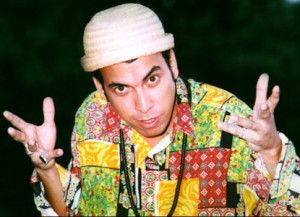 Chico Science demonstrating crab hand gesture.
Chico Science demonstrating crab hand gesture.
It's less about musical definition of the movement, since the two bands that it started off with have very different styles. Would you say that's fair to say?
That's definitely fair to say. Mundo Livre was very different from Nação Zumbi, in the sense that Mundo Livre was based more on new wave rock ‘n’ roll mixed with samba and the samba-soul-funk fusions of Jorge Benjor, whereas Nação Zumbi is much more about fusing local Pernambucan styles with rock, funk, hip-hop, Jamaican raggamuffin and electronic dance music. Nação Zumbi really had much more of an identification with the local Pernambucan styles, whereas Mundo Livre was drawing more from samba, as far as the Brazilian styles they were drawing on. The other thing about it is that the two bands were from two different geographic points in the city, and part of the whole idea of the movement was also coming together and uniting, so that fans from Mundo Livre and fans from Nação Zumbi could enjoy each other's music, and it was a way of uniting the city into a scene.. Diversity is really a strong part of the movement. I think Nação Zumbi became the emblem for the movement and their sound is most identified with mangue, undoubtedly. And Chico Science is the undisputed leader of the movement, but it was really a collective and that's part of the impact of the movement, too. The reason why I call it a movement is because it inspired communities to pick up a guitar, pick up a drum and create a band. Hundreds of bands were created in the wake of mangue, including in favelas where some musicians even made their own electric guitars, from scraps. This was something that impacted the entire city. The do-it-yourself philosophy of punk was a part of mangue, as well. You do your own thing. And Mundo Livre really subscribed to that. They had a lot of punk and new wave influence. Diversity is a hallmark of the movement.
So, about Chico Science, I've read a lot of people calling him a legendary character. What do you think about him, other than the fact that he died at such a young age, made him such a charismatic figure?
I never actually met Chico in person, but I was able to see him perform live twice: once at Central Park SummerStage in Manhattan in 1995 and once at Celebrate Brooklyn in 1996. He had an undeniable stage presence and charisma that grew from the time I saw him in ‘95 to ‘96. He matured tremendously in one year. He was already amazing in 1995 and in 1996 it was out of this world. It was like seeing someone like you've never seen before on stage. He had such charisma and presence and energy. It was phenomenal. What made him so charismatic? Well, there are a lot of factors. For instance, it's interesting to note that he was born to a lower-middle class family, so he was right smack in the middle socio-economically. Even racially, he was considered moreno, so in the middle, in terms of physical appearance. He hung out with university students and people from the favelas; he was able to relate to both. And he was the person who brought everybody together. Mundo Livre was more middle class and Chico Science himself more lower-middle class, but when he met the guys from the bloco afro Lamento Negro, who were from a much poorer background, and he brought them into the band that would become Nação Zumbi, that was really when everything started to happen for mangue and for Nação Zumbi. It was the coming together of people from the Afro-Pernambucan culture, who could bring some of the local rhythms to play, into the band, but it was Chico who was the one who was able to bring all of that together. He had this magnetic personality. He was positioned to do this and he had this tremendously charismatic way about him, even when he would speak. And also he was extremely creative. The way that he sang? Nobody sang like him before he came onto the scene. He was able to take the street poetry of the embolada and fuse that with hip-hop rapping and Jamaican raggamuffin and heavy metal and all of these different influences, in such a way that what came out was not any one of those things and you couldn't quite tell where exactly one rhythmic phrase was coming from, but you could tell that it was all in there and so he really elided the boundaries between genres, like "oh, that sounds kind of like embolada, but it's like rap, too, and wow, that part sounds like Jamaican raggamuffin.” It was synthesized in such a way that it was completely authentic. It was him. It wasn't like "I’m just going to be throwing these mixtures together and let's see what happens." He had assimilated all of these influences into his personality, into who he was to such a degree. He grew up listening to what they call black music in Brazil, which is soul and funk and later rap and hip-hop, so that was as much a part of his musical identity, as was also rock music, which his brothers listened to, as was the local folk music. It was all a part of his musical upbringing. And that was the other thing that made him so charismatic, too. He was able to assimilate all of these influences himself and come up with this completely original style that inspired thousands of people. He also spoke about the socio-economic realities of Recife in a brilliant, poetic way.
So, the original manifesto is in 1991. When is it that the movement really takes off and becomes known on a bigger scale? At what point were people outside of Recife paying attention to this stuff? Like in Rio and São Paulo?
Things started to move quickly. In 1992, after hearing about the mangue manifesto, MTV came to Recife to interview Chico Science and Fred Zero Quatro. The subsequent footage was broadcast on the Brazilian MTV channel during its coverage of the Hollywood Rock festival in Rio, creating a buzz in the south of the country. In 1993, in Recife, producer Paulo André Pires launched the debut Abril Pro Rock festival, which brought together 1,500 people to see only local bands--something that hadn’t ever happened before. After performing in that festival, the two pioneering mangue bands went to do shows in São Paulo and Belo Horizonte, leading to the contracting of Chico Science and Nação Zumbi by Sony and Mundo Livre by the domestic label, Banguela. It was in 1994 when the scene really took off with the release of Chico Science and Nação Zumbi's debut album, Da Lama ao Caos [From Mud to Chaos], as well as the debut album of Mundo Livre S/A. Chico Science and Nação Zumbi then went on a tour in five European countries and the U.S., where they opened for Gilberto Gil at SummerStage in ‘95. Another factor that contributed to the exposure of the movement was that Sony got two songs of Chico Science and Nação Zumbi on two telenovelas--two Brazilian soap operas--on Rede Globo, the biggest TV network in Brazil. And though radio largely ignored mangue, the Brazilian press recognized the importance of the movement from the beginning.
I got to interview Chico Science's parents. His father told me that his son's popularity tripled after death. He became like a martyr or a legend. You would see his image spray painted onto walls and he was just so much more popular after his death. But it was a very short window. Nineteen-ninety was when the band started to form until ‘97 when Chico died, so who knows what would have happened if he had continued? But people were starting to pay attention.
Chico Science graffiti
During this period, ‘94 to ‘97, how many groups would you say started up that associated themselves with mangue?
There were other bands that were around before mangue, or that developed around the same time, that were lumped into the mangue category. The bands Mestre Ambrósio and Cascabulho are great examples. Their approaches were distinct from mangue in certain respects, more focused on the folkloric side of the equation, but people started to associate them with mangue. In Recife, when I was there in 1998, there were hundreds of bands. Many of those identified as mangue and others not. There were probably a couple dozen more prominent bands and artists that were a part of the scene, at least when I was there in 1998, but there were so many others. There was an explosion of music at that time, in the ‘90s.
And a lot of them were doing similar things, in terms of mixing these traditional genres with popular music?
A lot of them were. A lot of the bands were copying what Chico Science and Nação Zumbi did, which is not surprising. For example, taking the alfaia, the bass drum, from maracatu, and mixing it with distorted electric guitars and rap-like vocals. A lot of bands were doing that. There were straight up hardcore punk bands. There was a band called Devotos or Devotos do Ódio--“the Devotees” is what they were shortened to, but they used to be called the “Devotees of Hate.” They were this hardcore band that, if you listen to them there's nothing identifiably "Brazilian" about them, except the Portuguese language, really. And I remember seeing them at a festival with some other local bands and I think they were the headliner that night at this festival, and it was 3 o’clock in the morning in this open air festival way out on the margins of the city, and I'm thinking to myself, “What does this have to do with mangue? What does this have to do with the local folk music?” I still didn't quite get it. And then after living there for five months I realized, they don't make a distinction. It's all part of who they are. They don't think of that as foreign music. They don't think of hardcore punk or heavy metal as foreign music, or even rap. They've reappropriated it, indigenized it, made it their own. So there was really a diversity of things going on.
I should also mention that when I lived in Recife, I happened to be staying about a 10-minute walk from probably the most legendary venue on the scene called Soparia, which was this soup place, a bar where they served soup and beer and whatever else you wanted to eat and drink. It was a very small bar and Chico Science had played there and you could see on any given night of the week a blues band, a traditional maracatu group, a mangue fusion type of band, so many different kinds of bands and everybody dancing and enjoying themselves--people of all different backgrounds and ages. It was pretty amazing.
That's incredible that there's this transformation in such a quick amount of time from this place that's considered one of the worst places to live in the world to being a cultural capital of Brazil.
Absolutely, absolutely. That was one of the things that struck me, just the vitality, the vitality of the movement. And I think there were so many factors that made it vital. But they were just so self-aware and so smart about linking themselves to their environment at the same time that they were open to what was going on in the rest of the world. They were able to negotiate that whole process of globalization in a way that was extremely smart, extremely careful and extremely effective, I think. They were able to maintain their artistic integrity while doing it. They were able, at least in certain cases, to achieve some commercial success at it. And they were able to make differences in people's lives. Help to boost the self-esteem in the city. Help to create this fresh new identity. They gave people hope for some kind of a life. People thought, “Well, at least I can be a musician,” and that was significant, especially for folks who have very few options and a lot of people did become musicians. And it also, of course, impacted fashion and cinema and many other areas of the culture. It was really remarkable.








